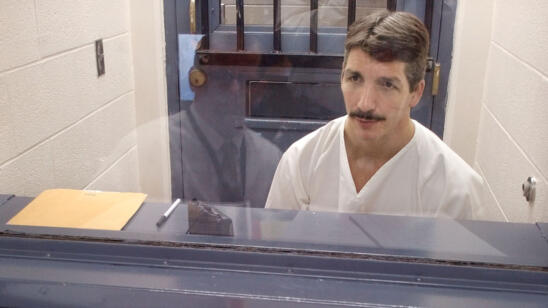“Am I gonna be at the grocery store? Am I gonna be with my kids? Where am I gonna be when this is gonna hit like a brick?” asks retired detective Kim Mager, pondering the aftereffects of garnering the confessions of serial killer Shawn Grate.
In 2016, Grate was arrested at an abandoned home in Ohio for the kidnapping and rape of a local woman, who was rescued after placing a 911 call while tied up as Grate slept.
Mager, then one of only a few female cops with the Ashland City Police, spent 33 hours over eight days extracting Grate’s confessions to five murders, kidnappings and multiple sexual assaults across the state.
The press dubbed the 40-year-old purportedly charming drifter “the Ladykiller.”
“Yes, he’s good looking, but the Devil’s good looking, too,” Grate’s mother told a British tabloid.
Grate’s violent crimes, which included strangling women to death and callously disposing of their bodies, shook Ashland, where Mager and her husband were raising their three kids. The detective sometimes passed crime scenes while driving her youngest son to football practice. The community was so small that one of the potential jurors for Grate’s case had been asked out on a date by the killer.
Interviews with Grate—one luckily recorded on a backup device Mager had in her shirt when the equipment in the interrogation room failed—serve as the backbone of A Hunger to Kill: A Serial Killer, a Determined Detective and the Quest for a Confession that Changed a Small Town Forever, which she co-wrote with New York Times best-selling author Lisa Pulitzer. A&E True Crime spoke with Mager about having empathy for Grate, returning to normal life after dealing with brutality at work and the serial killer’s upcoming execution.
You hadn’t even been with Grate for two hours when you had him confessing to the kidnapping and rape of a victim who prefers to be known as Jane Doe. What told you that this was only the beginning of the interrogation?
It’s hard to put into words, but I could see there was something unresolved. I knew there was more, I just didn’t know that it was murder. I thought, I’m just gonna push as far as I can and try to not show judgment, because I could cause him to shut down. And in layers, it just kept coming.
He was actually somewhat congratulatory when I would catch something that didn’t make sense to me and follow up on it.
When seeking information from Grate, you repeatedly told he was a ‘standup guy.’ Was that hard to say?
Odd as it sounds, his personality sometimes wants to do the right thing. So, I guess with any suspect that I’m interviewing, they’re not always doing [wrong]. There’s a piece of someone that sometimes wants to rescue somebody—to lead me to the truth.
You write that you had legitimate empathy for Grate—how?
I live with empathy. I know officers who have to project empathy while they might not feel it. For me, I often look at someone and think, ‘He was four years old, at one point.’
Grate told me the story about him attacking one of his mom’s boyfriends as a tiny child because the guy was in the bedroom with his mom. And when hearing that, it’s almost like he’s telling me [how he] became [a killer].
There are times when it’s so difficult to not show shock or disapproval. There’s never a time when you get to say, ‘What you did is horrendous! This is what needs to happen to you!’ You never get to have that closure, because you don’t know if you’re gonna get to interview [that suspect] again. And in Grate’s case, it was never over. Every time I interviewed him, there was something else to catch.
Beyond Grate, throughout your 30-year interrogation career, how did you deal with returning to your normal life after a day of hearing about brutality? How did you process all of this?
Honestly, I can tell you, I have not processed it. I have never been debriefed in my entire career—meaning I’ve never had a case [after which] I got to sit down with someone to discuss what happened or how that was. That’s not okay for anyone.
I lived years where I felt like someone was blowing a fan on my eyes, where you feel like you just can’t breathe. Because it just keeps coming and hitting you and hitting you. And it’s incremental, too.
My faith and my family [have helped]. I go home to a really good situation. I can’t fathom going through what I went through with cases and then having things be in disarray at home. That would be too much.
But if I’m successful in a case, it catapults me to the next case. If I do a run where I have maybe 10 confessions in a row—and then have one case where I don’t have one, if I can’t solve the case, that’s the case that bothers me.
It’s like hopping across a creek on rocks. If I get [assigned to] one that I fail at, it’s harder to get to the next one. That’s how it works for me.
Your colleagues were watching your interrogation of Grate from another room—but at one point, they left their post, which is against protocol.
When I stepped out [to let Grate smoke], there was no one there. I looked at him. I was trying to assess whether he knew what was probably pretty clear. He did have this survival awareness. I just tried to act like there’s somebody right around the corner, which there wasn’t.
My lieutenant told me to tell my husband that that would never happen again—because he was nervous about his reaction. And he said, ‘We’ll look ridiculous. Please, don’t ever say this to anybody.’ And initially, I didn’t. But I thought, we all get tunnel vision, and we have to learn from this. Another officer can’t be left alone in a room with a serial killer who is not handcuffed. That’s senseless.
It’s not like some big exposé; there’s no shame in admitting that we have to do better.
You believe that Grate has committed crimes he hasn’t confessed to yet.
Absolutely, I do. I’m proud of getting a confession on the victim who lived—praise God—and I ended up with five who did not make it. But I do believe there’s more.
In the Jane Doe kidnapping and rape case, Dispatcher Sarah Miller helped to convince Jane to take a big risk in order to save her own life. You detail that and namecheck Miller and many others in the book.
Because I’m not a one-woman show, I am just a piece of this case. Sometimes when you’re the one who gets the confession, you get a lot of accolades. But there were so many pieces to this, a lot of people who did a good job. [Miller] did coax the victim into [untying] herself. The officers that showed up [at the vacant house]—wow. Officer Curt Dorsey’s instinct [about her location on the property] was phenomenal.
Grate is scheduled to be executed on March 19, 2025. How do you feel about that?
I’m not sure why, but I haven’t really allowed myself to think much about that. Some repressive coping? I don’t know. Currently, Ohio doesn’t have a legal means of execution, so we’re kind of at a standstill.
Look what [the victims’] families have lost—every holiday and barbecue. Those families got a life sentence.
Related Features:
An FBI Agent Recounts a Repulsive Request by Serial Killer Cary Stayner During His Interrogation
Exploring the Mind of BTK: Dr. Katherine Ramsland on the Benefits of Getting to Know Dennis Rader


